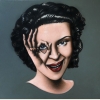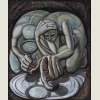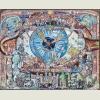Vitebsk Art School: Marc Chagall and Yehuda Pen
|
The book was written in 2001 and published by L'Harmattan in the Collection Bielorussie series and in 2007 it was translated and published in Belarus. This book is the result of a laborious research of Belarusian and Russian historical records, archival documents, original sources and publications. It has been written in response to vividly increasing interest to the Vitebsk School, to Marc Chagall as one of its most famous representative and to Suprematism as an art movement. To make the book clearer to a reader who is not familiar with Belarusian history and culture Claire Le Foll included a lot of historical references. The author points out that in spite of its tremendous influence on Russian avant-garde and on European art of the 20th century, the Vitebsk School unfortunately hasn’t developed a Western visibility. The most known and popular representatives of the School are Marc Chagall and Kazimir Malevich. But the first chapter of the book is devoted to Yehuda Pen (1854-1937) who was the founder of a private school of fine arts in Vitebsk. In a short period of time it became the cradle of a constellation of brilliant artists. Then the author highlights Marc Chagall’s activities as an initiator of the Vitebsk Fine Arts School* and as the Fine Arts Commissioner in Vitebsk region. And in the final chapter Claire Le Foll expounds her views on the Vitebsk School, which became in the first place, a unique phenomena and a distinctive trend of European art, and on the other hand, is a priceless integral part to Belarusian cultural heritage.
Students and lecturers of the Vitebsk Fine Arts School (1920). From left sitting: unknown, I. Gavris, Y. Pen, D. Yakerson, M. Chagall, unknown, V. Ermalaeva, K. Malevich
Y. Pen. Letter from America (1903) Y.Pen. Portrait of Marc Chagall (1914)
* It’s an educational institution as distinct from 'the Vitebsk School' which is a definition of a group of artists who lived and worked in Vitebsk, Belarus in the first quarter of the 20th century. |





 A book by a French historic Claire Le Foll The Vitebsk School (1897-1923): its birth and Golden age in days of Pen, Chagall and Malevich was presented by the author herself at the XV International Fair Books of Belarus – 2008.
A book by a French historic Claire Le Foll The Vitebsk School (1897-1923): its birth and Golden age in days of Pen, Chagall and Malevich was presented by the author herself at the XV International Fair Books of Belarus – 2008. 

